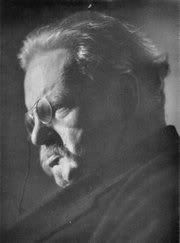Snow Day

HEAD(hed), (n.) 1. the top part of the human body or the front part of an animal where the eyes, nose, east and mouth are. "Your brain is in your head."
DIBS(dibz), (n.) 2. a thick, sweet syrup made in countries of the East, especially the Middle East, from grape juice or dates. [Arabic "debs"]--World Book Dictionary, 1976.


G.K. Chesterton helped us understand the distinction when he wrote, “You say grace before meals. All right. But I say grace before the concert and the opera, and grace before the play and pantomime, and grace before I open a book, and grace before sketching, painting, swimming, fencing, boxing, walking, playing, dancing and grace before I dip the pen in the ink.”
I believe he grasped well what the apostle Paul wrote to the Corinthians, “Whether, then, you eat or drink or whatever you do, do all to the glory of God.” (1 Cor. 10:31) If you would like another example of the deep implications of this, read John Piper’s “How To Drink Orange Juice to the Glory of God”
Nadab and Abihu were two sons of Aaron, designated priests of the tabernacle. I can’t rightly say they learned a lesson concerning the holiness of God because that would imply they got a do-over; however, they certainly serve as examples. After receiving all these instructions about what God expects from His people and how He made it possible for everyone to enjoy tolerate His presence, after being consecrated and set apart and dwelling in the tabernacle for days, after seeing fire come from the LORD and consume the sacrifices, these boys got it in their heads they could do things their own way and God would be pleased (10:1).
These men were priests, not Amorites, Canaanites, Hittites, Hivites or Mosquito-bites. There were not strangers from Egypt, nor were they Philistines. They were not atheists or philosophers or from a race of people who did not know there was a God to believe in. They were ordained men of God, serving in office—and God struck them.
There are just some things God will not permit. Fire has a place in the worship system, incense did too. But not in the new way they sought to use it.
Fire is interesting because it has parameters for relationship. In the right relationship, it warms, cooks, even supplies light and power. But if the parameters are overstepped and the relationship is altered, fire consumes. If you know how to deal with fire, there is blessing. If fire is mishandled, there are consequences.
And they saw once more fire come out from the presence of the LORD . . . and that was the last thing they saw.
“It is a terrifying thing to fall into the hands of the living God.” (Hebrews 10:31)
“God is a consuming fire.” (Hebrews 12:29).
This is the difference between “sacred”, “secular” and “holy”, “unholy.” The Christian life is not found in traditions or trends—I think many would be surprised to find out that even denominational tradition is not what they think it has been (did you know that Baptists did not always immerse (**gasp**)?!). The point God is making is that the people of God are to imitators of Him.
Jesus said, “Therefore you shall be perfect, just as your Father in heaven in perfect.” (Mat. 5:48).
Peter echoes that highest standard, “But just as He who called you is holy, you also be holy in all your conduct, because it is written, ‘Be holy, for I am holy.’”. (2 Pe. 1:14-15)
The more we know God, to more we will understand who He is, the more we understand who He wants us to be. The primary pursuit of any believer is to apprehend God!
If God were merely an idea, or an ideal for that matter, a synonym for “goodness” or “beauty” or “truth”[i], then we may certainly be bound up in dividing the sacred from the secular. God is not a notion—this is what got Nadab and Abihu killed. Aaron was told not to grieve because of the seriousness of their actions. Ironically, Nadab and Abihu knew God by experience, but their reckoning overreached their reality. They got careless. They had directions, but they got careless. Ignorance? I don’t think so. Negligence? More than likely.
There are times when we don't know what to do. Is this the time to guess and assume? Is it the time to do nothing? Aaron's sons did know what to do AND they made an assumption. As trite as it may sound (forgive me Mr. Murphree), notice the one thing they did not do was to pray about it. When in doubt, pray.
Why does God demand Holiness? That we may be like Him.
He wants us to be consistent, distinguished in living for consecration over comfort, in spirit over self, in devotion over divulgence, in action over apathy, in righteousness over rhetoric, in sinlessness over sinfulness.
Aaron knew the difference. This is why after the bodies were removed and Moses gave instructions for an offering why Aaron could not participate—he knew he could not override God’s expectations . . . and taught Moses a lesson to be careful with details.
************
[i] Tozer, A.W. The Pursuit of God. Camp Hill: Christian Publications, 1982.